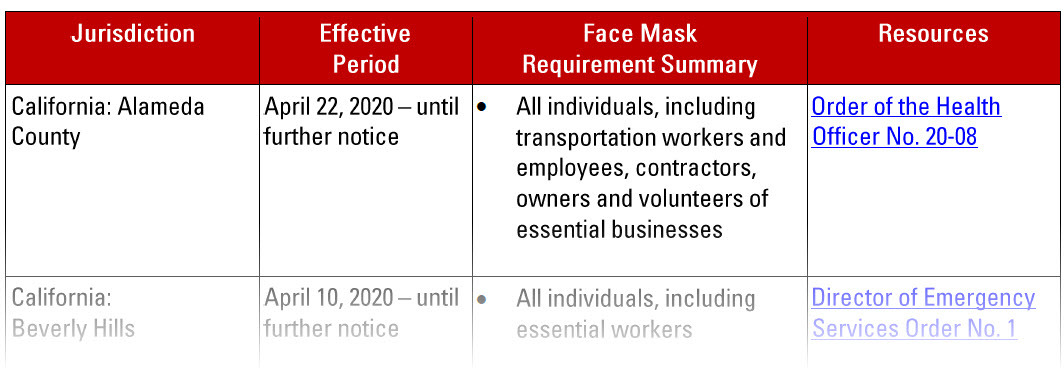Last week, orders went into effect in New York, Maryland, San Francisco, and Washington, DC, requiring all employees and customers of essential businesses and transportation services to wear a face covering over their nose and mouth. These executive orders follow similar requirements in effect in New Jersey, Pennsylvania, Los Angeles and other states and municipalities. Some orders cover only essential workers, and others cover all individuals when out in public; most exempt children under age 2, as well as individuals with medical conditions that prevent them from wearing a mask.1 While most businesses have the right to deny entry or service to any customer without a mask, businesses typically may not require documentation for a medical condition.
Notably, many of these executive orders require employers to foot the bill: requirements in Los Angeles, Sonoma County, New Jersey, New York, Pennsylvania, Rhode Island and Washington, DC, direct employers to provide employees with face coverings and/or gloves at the employer’s expense. Use of medical-grade face coverings is discouraged so those supplies are conserved for health care professionals and other first responders.
Some executive orders that do not expressly call for employers to pay for face masks nonetheless require employers to take a range of precautionary measures to protect any core personnel who are required to work onsite either because the employer falls within a critical infrastructure sector exempt from stay-at-home orders or to maintain minimal operations (such as payroll, or essential functions that support the rest of the workforce in teleworking) in a business that is not deemed part of the critical infrastructure. An April 2, 2020, Georgia Executive Order, for example, requires businesses to provide onsite workers with “personal protective equipment as available and appropriate to the function and location of the worker within the business location.” In conjunction with the CDC guidance and the general duty of employers under the Occupational Safety and Health Act to provide employees a safe workplace free from recognized hazards (as explained in Pillsbury’s March 16, 2020 client alert), these requirements also, in practice, require employers to furnish their onsite employees with face masks. Just as employers may not require employees to pay for the employee’s desk, computer, or other in-office equipment that is owned by the employer, this means that the employer must pay for the face masks, unless an employee opts to use a personal face mask.
Most of these orders authorize enforcement by local and state law enforcement and punish violations with a range of fines and terms of imprisonment. In Rhode Island, for example, the Department of Business Regulation (DBR) is authorized to make unannounced visits and inspections and non-compliance can be reported by email or by calling the DBR hotline at (401)889-5550.
See the chart below for a list of state and local orders that specifically require employers to provide employees with face masks, current as of the date of this alert. As new and updated orders are being released on an almost daily basis, businesses are encouraged to follow the most up-to-date state and local requirements and guidance.
Click here to view the full chart (pdf).

Workplace safety is a dynamic area where new guidance is issued nearly daily on the Federal and state level. This information is current as of April 21, 2020. For the most up-to-date information, readers are encouraged to consult the websites identified in this article.
Pillsbury clients may obtain advice and strategic input by contacting Cassie Lentchner, Julia Judish, Nicole Steinberg or other Pillsbury lawyers, who can also coordinate involvement of colleagues on the Pillsbury Crisis Management Team and COVID-19 Taskforce.
Pillsbury’s experienced multidisciplinary COVID-19 Task Force is closely monitoring the global threat of COVID-19 and providing real-time advice across industry sectors, drawing on the firm’s capabilities in crisis management, employment law, insurance recovery, real estate, supply chain management, cybersecurity, corporate and contracts law and other areas to provide critical guidance to clients in an urgent and quickly evolving situation. For more thought leadership on this rapidly developing topic, please visit our COVID-19 (Coronavirus) Resource Center.
1. By contrast, an April 13, 2020, Georgia Executive Order does not mandate face masks but suspends a Georgia statute that makes it a misdemeanor for a person to “wear[] a mask, hood, or device by which any portion of the face is so hidden, concealed, or covered as to conceal the identity of the wearer.” The Order makes it lawful for any individual to wear a face mask “for purpose of complying with the guidance of any healthcare agency or to prevent the spread of COVID-19.”
